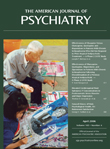Time Course for Antipsychotic Treatment Response in First-Episode Schizophrenia
Abstract
Objective: The authors examined early onset of antipsychotic action and early prediction of nonresponse to antipsychotics in patients with first-episode schizophrenia. Method: Time to clinical response (≥20% improvement in total score on the Positive and Negative Syndrome Scale [PANSS]) was determined in 522 participants in a randomized, controlled trial comparing risperidone and haloperidol. Median treatment length was 206 days. Results: Clinical response was achieved in 77% (N=400) of subjects. Among these patients, clinical response was achieved in 23.3%, 23.3%, 18.5%, and 12.5% at weeks 1, 2, 3, and 4, respectively, after treatment initiation. However, in 22.5% of patients, response was not achieved until after 4 weeks, and in 11.2%, it was not achieved until after 8 weeks. In 45% of patients, response was achieved with a dose of 1–2 mg/day, in 27% with 3 mg/day, in 17% with 4 mg/day, and in the remaining 11% with higher doses. Improvement in the PANSS total score of at least 30%, 40%, and 50%, respectively, were achieved by 63.0%, 44.8%, and 27.5% of patients. Conclusions: Time to antipsychotic response varied widely, suggesting that, in first-episode schizophrenia, longer treatment trials may be necessary.



